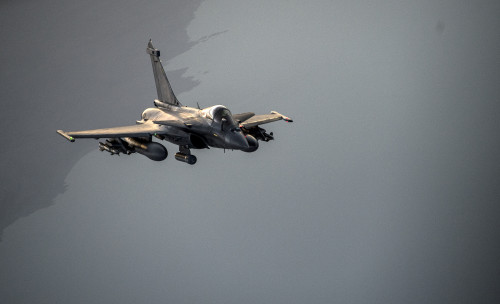France is making a big push to sell its Rafale fighter jets to Bangladesh, hoping to capitalise on a change in leadership in Dhaka, the Sunday Guardian reports. Discussions are progressing with the new caretaker Prime Minister, Mohammad Yunus, who is seen as more receptive to France’s offer than his predecessor, Sheikh Hasina. This comes as Bangladesh seeks to modernise its air force, officially known as the Bangladesh Air Force or BAF.
Back in March 2017, the Directorate General of Defence Purchases (DGDP) in Bangladesh issued a tender for eight multi-role combat aircraft, with an option for four more in the second phase. The deal, valued at approximately €2.5 billion, is seen as critical to bolstering Bangladesh’s aerial defences and enabling a range of operations, including anti-surface, maritime, and offensive counter-air missions.
While the French Rafale is a strong contender, it faces competition from the European-built Eurofighter Typhoon. However, the Rafale faces some headwinds. Some argue that Bangladesh should avoid purchasing the same fighter jet as its neighbour India. They suggest that doing so could limit Bangladesh’s tactical advantage, as India would have intimate knowledge of the Rafale’s capabilities and potential weaknesses. Furthermore, critics argue that acquiring the Rafale could signal Bangladesh is aligning too closely with India’s defence strategy, and they urge Dhaka to diversify its defence equipment sources.
French President Emmanuel Macron visited Dhaka in September 2023, following his attendance at the G-20 Summit in New Delhi. This visit, the first by a French President in 33 years, aimed to persuade Bangladesh to choose the Rafale. However, Macron left without a firm commitment from Bangladesh.
The BAF has laid out detailed specifications for the new fighter jets. They require twin-engine aircraft with a minimum thrust of 5,500 kg dry and over 8,000 kg with afterburner. The aircraft must also have at least eight hardpoints and a payload capacity of no less than 5,000 kg. The BAF’s requirements extend beyond the aircraft itself, encompassing maintenance, training, and a comprehensive set of air-to-air and air-to-surface munitions. Deliveries are expected to occur in two phases, with the first batch of four aircraft arriving first, followed by the remaining aircraft 18-24 months later.
The outcome of this competition remains uncertain. The decision Bangladesh makes will have significant implications for both France and the balance of power in the region.
For more information, hit the Source below
